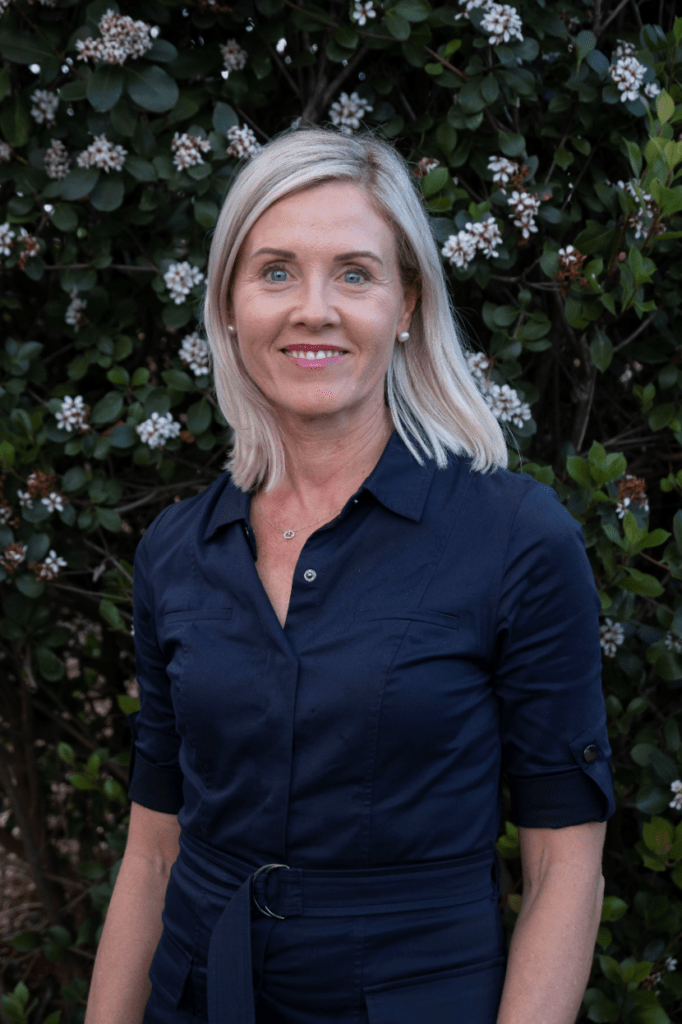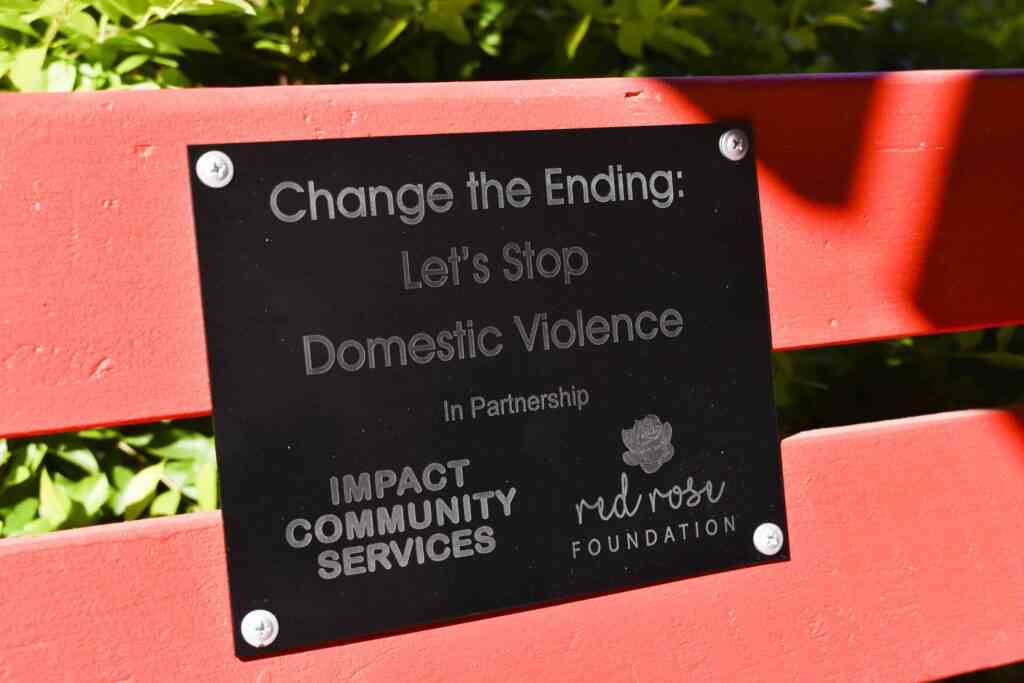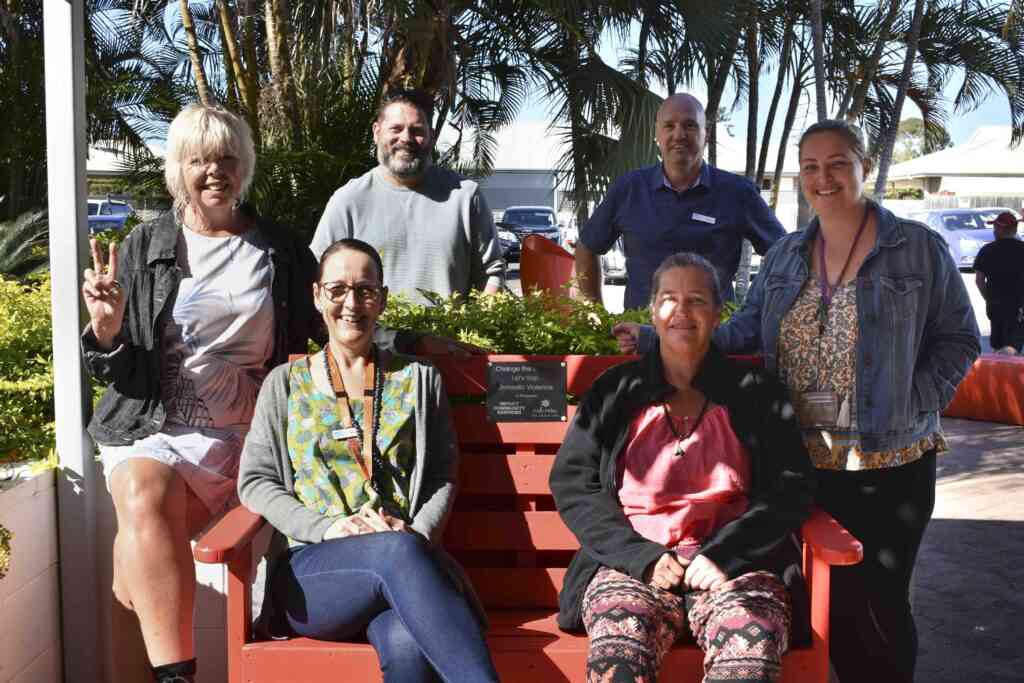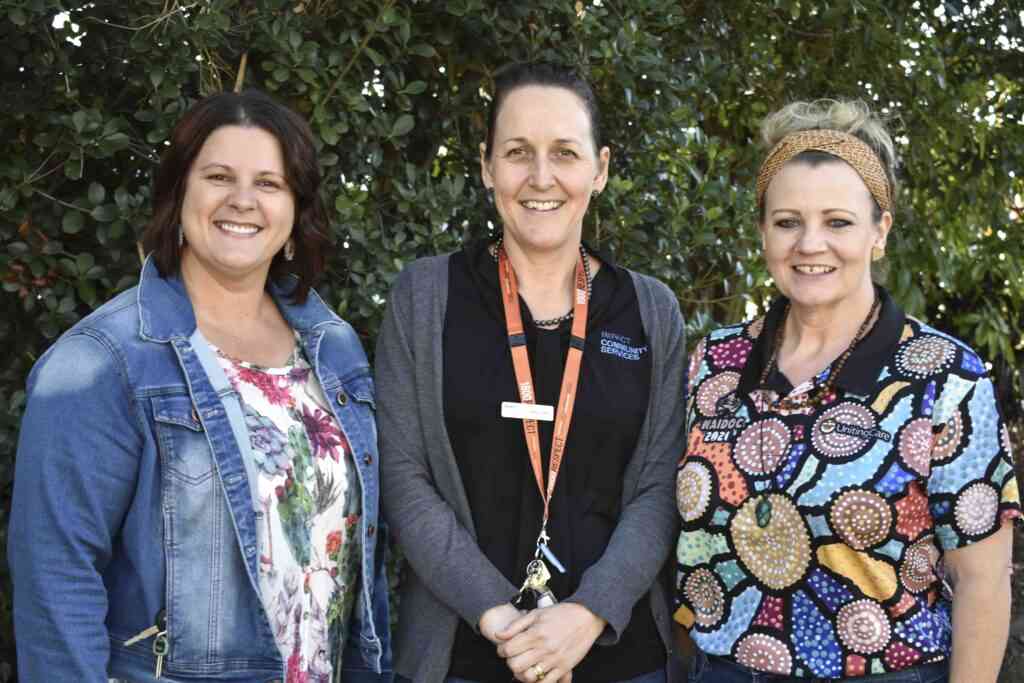- Home
- Stronger Together
- Support & Wellbeing
- Disability & NDIS
- Mental Health
- Families & Parenting
- Support for Individuals
- Community Health
- Employment & Training
- About Us
- About us
- Get Involved
- Governance
- Social Enterprises
"STRONGER TOGETHER" is a weekly column where Tanya explores key issues. This week Tanya discusses the vital importance of community engagement and collaboration in addressing and overcoming the challenges of gender-based violence, as highlighted in our podcast episode 7 featuring Jo Leverett from the Zonta Club of Bundaberg.
By Tanya O'Shea, Managing Director, IMPACT Community Services
The 16 Days of Activism Against Gender-Based Violence campaign, spanning from November 25 to December 10, brings global attention to an issue that’s often concealed in the shadows until it's tragically too late—gender-based violence.
Statistics from the Australian Institute of Health and Welfare on gender-based violence in Australia are alarming to say the least:
IMPACT Community Services is passionate about this movement, which aims to do more than just raise awareness about gender-based violence; it seeks to create a lasting and positive change that echoes throughout societies.
In our most recent STRONGER TOGETHER Podcast (Episode 7), I sat down with Jo Leverett, Zonta Club of Bundaberg board member and Zonta Advocacy Committee chair, to discuss the importance of community engagement and collaboration in preventing and eliminating gender-based violence.
Our conversation shone light on the indomitable spirit of those who have turned personal tragedy into powerful advocacy. The heart-wrenching stories of Hannah Clarke and Allison Baden-Clay, as shared by their families, emphasise the pressing need for societal change, inspiring legislative reforms such as the landmark legislation on coercive control in Queensland.
Over the 16 Days of Activism, the Zonta Club of Bundaberg’s projects, such as ringing bells to honour the victims of gender-based violence or lighting up fig trees in orange, are powerful expressions of support and memory.
Yet, our responsibilities extend beyond symbolic gestures. We must continually challenge ourselves and our community to recognise and address all forms of violence, broadening our understanding and language to encompass the diverse experiences of individuals facing violence and oppression.
As we approach the Day of Community on December 8, we extend an invitation for everyone to gather in Buss Park. Wear orange, symbolising a brighter future, and make the pledge to a future free from all forms of violence.
Our strength lies in unity; together, we can be the change. Remember, if the discussions in this column resonate with you, support is available. Contact Lifeline at 13 11 14 or visit impact.org.au for additional resources.
Last week, IMPACT Community Services’ Managing Director Tanya O’Shea spoke at the launch of Zonta’s 16 Day of Activism to end Gender Based Violence. During and after the event, there were many questions around what people should and should not do as bystanders to domestic violence, and how to approach someone if you are concerned they may be living in a domestic violence situation.
IMPACT Community Services supports domestic violence victims and families living with domestic and family violence through our Intensive Family Support program. This article will offer practical guidance on what we can do as bystanders, as well as what not to do if you witness or suspect domestic violence.
We have all been touched by family and domestic violence in some way. Some of us have experienced and survived it ourselves. Many of us have known someone who is in a domestic violence situation, and we’ve all seen the news reports calling for changes after the death of yet another person at the hands of their partner or spouse.
It’s a sensitive topic, and if you know or suspect that someone is experiencing domestic violence, it can be hard to know what to do, what to say and how to best support them.
Tanya reminds us that as bystanders we have a choice.
“The choice is not to judge, condemn or question. The choice is not to think that social issues such as domestic violence don’t affect me, choosing not to watch stories on the news or listen to the radio or on your social media feed,” she said.
“Turning your heads, reading your phone, remaining in the comfort of your home telling yourself you shouldn’t get involved when you hear the screams next door. Falsely telling yourself those things only happen to other people.”
It’s important to preface the rest of this article by stating that at all times you must keep your own personal safety at the forefront of your actions.
The truth is, there is no one size fits all approach when it comes to domestic violence, because every situation is different. Allowing yourself to be guided by the person who is surviving the abuse (if possible) will allow you – and them – to lower the level of risk.
Remember, domestic violence isn’t just physical abuse. It also includes emotional, financial, sexual, social, verbal, spiritual, elder and child abuse. For more information on the different types of abuse that fall into domestic and family violence, we suggest reading this article from Mission Australia, which offers definitions of each: https://www.missionaustralia.com.au/stories/safe-homes/types-of-domestic-violence-abuse
IMPACT Community Services Bystander Program Coordinator Sasha Sloat said it’s vital to remember that your job is to empower and support. “It’s important not to take it personally if they are dismissive, rude or reject your offer to talk or help as they’re just trying to keep themselves safe,” she said. “Above all, offer to talk, but don’t judge – as soon as you judge them, whether it be for not leaving or something else, you are no longer a safe space.”
Help is available if you or someone you know is experiencing domestic violence. It’s important to bear in mind that some services will require evidence in order to provide financial assistance. This could be a DVO or a support letter from a service such as IMPACT Community Services or Edon Place, or a letter from Children’s Services.
IMPACT Community Services supports victims and families living with domestic violence through their Intensive Family Support program. Ph 4153 4233
Edon Place provides specialist domestic and family violence support services in the Bundaberg and North Burnett regions, including counselling, perpetrator intervention, temporary crisis accommodation and a range of other support services. Ph 4153 6820
The Department of Housing can provide funding for those escaping domestic violence to start over with furniture and whitegoods or cover the cost of moving their items interstate.
Uniting Care offers Escaping Violence Payments of up to $5000 within 12 weeks of leaving a domestic violence situation. You will need to provide evidence to access this payment.
Energy providers are able to clear debt if you can provide evidence of domestic violence.
Bundaberg Police have a dedicated Vulnerable Persons Unit which supports families living with domestic violence where there has been continued Police intervention.
Keeping Women Safe in their Homes (KWSITH) helps women and their children who have experienced family and domestic violence to remain in their homes or a home of their choosing, when it is safe and appropriate to do so. Keeping Women Safe in their Homes | Department of Social Services, Australian Government (dss.gov.au)
Temporary Visa Holders Experiencing Violence Pilot provides financial assistance to people on temporary visas who may be experiencing family and domestic violence and financial hardship. Family and domestic violence financial assistance | Australian Red Cross Emergency Relief to provide one-off assistance to individuals with no or low income or those experiencing other life-changing events. This can include food, transport, clothing, budgeting assistance and utility assistance. Emergency Relief | Department of Social Services, Australian Government (dss.gov.au)
National Debt Helpline provides over the phone Financial Counselling. The 1800 007 007 telephone service provides a single contact point for people to access financial counselling, either immediately on the phone, or via a referral to your closest Financial Counselling service. Welcome Page - National Debt Helpline (ndh.org.au)
Good Shepherd Australia and NZ provides loans up to $2000 for essential goods and services with no fees and no interest.
Victim Assist – provides financial assistance to victims of violence that happened in Queensland - 1300 546 587
NDIS – for people with a disability who are actively receiving support through NDIS, may be able to access a crisis payment, this should be discussed with the client’s support worker
Legal Aid Queensland - 1300 65 11 88
Women’s Legal Service – 1800 957 957, provides free legal and social work help with domestic violence, complex family law and sexual assault notes counselling privilege matters to women and people who live and identify as women in Queensland.
DVConnect Womensline – 24 Hour Domestic Violence Hotline – 1800 811 811
DVConnect Mensline – 9am until Midnight – 1800 600 636
Kids Helpline – 1800 551 800
Emergencies – Police/Ambulance/Fire – 000
"STRONGER TOGETHER" is a weekly column where Tanya explores key issues. This week Tanya discusses gender based violence.
By IMPACT Community Services Managing Director Tanya O'Shea
Imagine a world where women and children didn’t fear being hurt or killed in their own home.
There is no room in our society for gender-based violence, yet it can and does happen to people from all walks of life.
Tomorrow I will be speaking at the launch of Zonta Club’s 16 Days of Activism to End Gender Based Violence. This is timely given the announcement of the Australian Government’s National Plan to End Violence against Women and Children 2022–2032. It’s fantastic that all levels of government are now working together and committed to driving real change. It’s much needed.
We all have a role to play in ending violence against women and children in our community.
As bystanders, we have a choice to not judge, condemn or question. We can choose not to think that social issues such as domestic violence “don’t affect me”, choosing not to watch stories on the news or listen to the radio or on your social media feed. Turning your heads, reading your phone, remaining in the comfort of your home telling yourself you shouldn’t get involved when you hear the screams next door. Falsely telling yourself those things only happen to other people.
With the housing crisis and rapidly rising cost of living, our community is facing unprecedented pressure. As the pressure has risen, we have seen a steady increase in domestic violence. We know that extra pressures can cause people to act differently to how they normally would. Remember, you can’t control the behaviour of others, but you can control what you do next.
No one starts their life wanting to be excluded, or homeless, or unemployed or a victim of domestic violence. No one wants to live a life filled with fear. Sometimes, women don’t always feel like they have an alternative choice. They don’t feel comfortable speaking up, they don’t feel like anyone will believe them, they don’t feel like anything will change even when they do speak up.
If you are experiencing domestic violence, please reach out. We are here, we are listening, and we believe you. We have a team here to support you - you’re not alone.
At IMPACT Community Services we see firsthand the devastating effects of family and domestic violence. We support women and children who are living with domestic violence through our Family Support Program.
IMPACT Is part of a wonderful multi-agency team in Bundaberg that is building a tribe around the women, children and families who are coming into our care as a result of family violence. We walk beside them as they navigate a new beginning, and every day we see stories of hope, of change and brighter futures for women and their children.
If you are experiencing domestic violence, you can reach out for help to the following places:
IMPACT Community Services – 4153 4233
Edon Place - 4153 6820
DV Connect Womensline – 1800 811 811 (24 hours)
1800 RESPECT- 1800 737 732
National Domestic Violence Hotline- 1800 799 7233
If you or someone you know is in immediate danger always call Queensland Police on 000.
By Tanya O'Shea, IMPACT Community Services Managing Director

Each May, Queensland marks Domestic and Family Violence Prevention Month (DFVP Month) to raise community awareness of domestic and family violence.
The aim is to send a clear message that violence in families and homes is not and will not be tolerated.
This year IMPACT’s Intensive Family Support (IFS) team have shown their support for the Red Rose Foundation’s Red Bench Project.
The Red Rose Foundation is a national not for profit charity that works to end domestic violence throughout Queensland, and the red bench is a permanent reminder that domestic violence occurs within all communities, everywhere.
IMPACT is proud to be a supporter of this initiative and has recently installed a red bench in the 108 Bargara Road courtyard for people to see, use, and understand.
Handmade by the NDIS participants in Rob’s Shed, the red bench and accompanying plaque provide a visual reminder that violence not only happens everywhere, but that we as an organisation and a community are actively working to stop violence and conflict in Bundaberg.
In the State Government’s “Not Now, Not Ever” report it was recommended that individuals, community groups and the private sector work together to help prevent domestic and family violence and support those affected.
This means we need to actively implement a whole-of-community approach and be accountable for ourselves and our actions in the face of conflict and violence.
We need to question the behaviour, not ignore it.

Last week I wrote about the launch of the MATE Bystander Program at IMPACT, which is another way we are working to end domestic and family violence in our community.
As mentioned previously, the project recruits everyday locals and trains them to recognise conflict behaviour and use safe intervention methods to interrupt the cycle of violence.
This initiative has also been driven by our IFS team who are involved in conflict resolution on a daily basis.
The IFS team has been working with families in the Bundaberg region, who are experiencing multiple and/or complex needs who have children unborn to 18 years of age, for over three years.
The service delivers parenting support through tailored interventions to build the skills and capacity of parents and carers to safely nurture and protect their children, and refers to external supports in need.

It was our IFS support team that recognised rates of violence were increasing during COVID, and it’s the IFS team that continues to manage the repercussions of the local housing shortage in this space.
With this added pressure it’s more important than ever that we as a community educate ourselves on safe intervention methods, and become a voice for those that have been silenced.
We need to actively stand up and say no to violence.
It’s not welcome in our community, and it won’t be tolerated by our people.
To find out how you can “Be Someone Who Does Something”, phone IMPACT today on 4153 4233 and mention the MATE Bystander Program, or email your interest to mclarke@impact.org.au.
Help us on our journey to improve lives.

Karen was raised in an environment of domestic violence as a child and found herself involved in a violent relationship later in life.
She has been out of that relationship for over five years now but remembers the horrific situation all too well.
“Most women don’t ask for help because they’re too traumatised and can’t make a clear decision,” Karen said.
“Asking for help is usually the last thing they do.
“Other people taking notice and making that step for them seems to be the only way out.”
Griffith University’s MATE Program, an acronym for Motivating Action Through Empowerment, seeks to educate everyday community members to become leaders in the prevention of violence and conflict.
Partnered with IMPACT Community Services, Uniting Care & Family Relationship Centre and the Family Law Pathways Network, Griffith will host a “Train the Trainer” event where 30 Bundaberg locals will be taught how to educate others on this principle.
The project aims to teach bystanders how to safely step in and address problematic behaviour as it happens.
IMPACT is holding an information session on Tuesday 18 May from 10am to 12pm for people who are interested in getting involved.
“I’d like to see more people educated about domestic violence,” Karen said.
“It’s hard to get people to fathom that women can’t just leave.
“You’re in fear of your life, of your kids’ lives if you have children… you know they’re going to harass you and hunt you down and contact all your friends and family, if they haven’t already isolated their victim.
“I got beat up for 5 hours in a unit block and not one person called the police. He got away with everything and he almost killed me.
“I’m over people turning a blind eye to domestic violence… there needs to be community involvement on a broad scale.”
Karen has also watched her daughter struggle through a violent relationship, and she wants the cycle to stop.
“Domestic violence is a reality in Bundaberg, it’s not just a number on a piece of paper,” she said.
“There are a lot of broken families, broken kids and broken mums.
“There are a lot of vulnerable women out there and the kids that are involved in domestic violence, the impact on them is extreme trauma.”
Locals who become involved in the MATE training will enter a three-day course and learn about gender stereotypes and how they impact our community, the role of the bystander and what safe interjection looks like, and methods to prevent conflict and violence.
Karen said while the MATE bystander approach would be great in the first instance, more follow up needs to be established.
“More training, more accommodation, more emergency housing, and around the clock support is needed,” she said.
Karen suggested a form of childcare would benefit parents fleeing domestic violence.
“They don’t get a chance to feel normal, to look for a job, they need support all the way through.”
For more information phone IMPACT on 4153 4233 or email mclarke@impact.org.au. To learn more about the MATE Bystander Program go to https://matebystander.edu.au/.